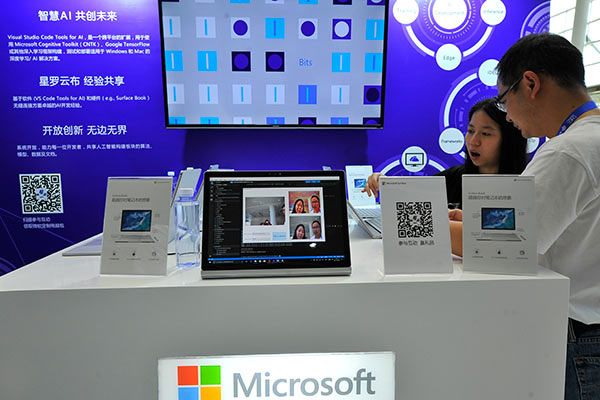Embracing challenges in the digital era
China Daily Updated: May 27, 2019

Please use three words to describe China's changes in the past 40 years.
Remarkable. Impressive. Inspiring.
What's the biggest challenge China faces today and how can the country overcome it?
China, along with most countries around the world, is facing the challenges and opportunities brought by digital transformation-technological advancements in cloud computing, big data, the internet of things, artificial intelligence, mixed reality and more are creating a new industrial revolution just like steam, electricity and computers did in the last century.
According to a study Microsoft commissioned from IDC (Unlocking the Economic Impact of Digital Transformation), China has one of the most ambitious digital transformation initiatives in the world and China could add about $716 billion to GDP by 2021 through digital transformation. The study has shown approximately 65 percent of China's GDP will be derived from digital products or services created directly through the use of digital technologies such as mobility, cloud, IoT and AI ... by 2021. This means that organizations need to transform today to ensure that they can deliver more than half of their products and services through digital channels or methods.
China's view on how innovation-driven development applies to technology aligns well with Microsoft's view on digital transformation. Initiatives like "Made in China 2025", "Belt and Road" and "Internet Plus" broadly encourage organizations across the economy to transform and become more innovative and productive by leveraging cloud technologies such as big data, IoT and AI.
Microsoft's aim is to provide the building blocks to empower organizations to thrive in this fourth industrial revolution.
Has competition intensified between Microsoft and Chinese companies?
We believe in healthy competition at Microsoft. In fact, we thrive on it, and believe that the entire technology ecosystem thrives in competition. Healthy competition keeps us on our toes and requires us to keep getting better and better. Being competitive in China has meant different things over the years and today, for us, it means going up against some very formidable players in certain segments. Healthy competition happens when everyone is playing by the same rules, but it also includes recognizing when cooperation makes the most sense for everyone. Our business has long relied on partnerships for growth and innovation, and we often partner with organizations in some areas that we might otherwise be competitive with in other areas.
How do you view China's role in the world today?
China's role in the world has certainly evolved since its opening-up 40 years ago and people are increasingly looking to China as a power shaping the global conversation.
For example, I think there's a lot of curiosity and interest everywhere today to understand the China model of equitable growth. For what I've learned about President Xi Jinping's vision, he's looking to not only bring more prosperity to the people of China and create a lot of opportunities, but to do it in a balanced, inclusive way. According to this vision, innovation is going to play a huge role for China. And not just innovation for innovation's sake, but innovation that drives this inclusive, balanced growth. I think it is a model that is needed for the world, and I think the world can learn from that.
Could China's experiences and practices be used to solve global problems?
I think China can serve as a pioneer in tackling many pressing global challenges, in part because it has such a unique population profile, challenge set and enormous scale. Addressing pollution and climate change is just one area where China is taking concrete action with a sense of urgency. Finding sustainable and effective solutions will require testing and iterating on many different ideas simultaneously across distinct regions. With policy imperatives, targets and resources to back it up, this approach will drive innovation that the world may benefit from.
For example, the shift away from coal power in China is driving innovation in wind and solar. Companies like Envision are working with Microsoft to use sensors, cloud, data and AI technologies to drive efficiency and provide predictive maintenance for reliability across distributed wind farms. This solution helps address an urgent challenge in China, but today we're also helping the company apply their solutions to customers all over the world.
Mobike is another example of a Chinese company addressing a pressing problem in China's congested cities by applying cloud, IoT devices, data analytics and AI technologies. Their bike-sharing model has been wildly successful in providing convenience for users and in reducing the necessity of car trips. And, with some of the world's largest cities as laboratories, they are well positioned to scale their model across the globe. They are already doing this today with Microsoft Azure as the technology platform.
And the environment is only one area where China is incubating solutions to global challenges. Similar dynamics can be seen in manufacturing, healthcare, transportation, financial services and, of course, consumer and digital products and services.
What measures are needed if China wants to deepen reforms and what are the key issues you will be watching for?
We will be closely watching policies and measures that encourage and support digital transformation of enterprises, especially State-owned enterprises. Specifically, industry upgrading measures that are aimed at improving productivity and efficiency through the adoption of technologies such as cloud computing, IoT, big data and AI, are of interest to us because they are areas where Microsoft can add the most value.
Another area of intense interest for us is related to technological innovation and industrial development in AI. This is an exciting and fast-developing area, but we believe that a thoughtful approach and a forward-looking regulatory environment are needed to promote the safe and responsible development of this emerging industry.
Finally, we will be watching for policy support for the participation of small and medium-sized enterprises in the Belt and Road Initiative. We believe concrete policies that support the technological transformation of SMEs in China will lead to more effective implementation of the Belt and Road Initiative, and Microsoft is uniquely positioned to help these organizations succeed in their international ambitions.
What is the most unforgettable experience you have had in China?
I have had the good fortune over the past several years of being able to visit different cities across the country and to get to know leaders from government, enterprises and lots of startups. Each place has unique food and the built environment varied based on history and culture, which I enjoy learning. They also have different business and social challenges, and the solutions and opportunities that people are coming up with to address them in their own backyards are just remarkable. And while they are all different in these respects, they all share digital transformation as their No 1 priority.
Whether it is about cost savings or efficiency, or inventing entirely new business models, the diversity of ideas and innovative approaches using cloud, data, AI and breakthroughs like blockchain across China has made a lasting impression on me. The world is becoming more and more interconnected across manufacturing, services, finance and more. More and more, we are innovating across national and regional boundaries already. I think we will see many of the solutions developed in these different regions of China making an impact in the world beyond their immediate neighborhood in the future.
Apart from economic development, what progresses in other realms have you witnessed in China in the past 40 years?
In terms of economic development, President Xi's vision of equitable and inclusive growth is already delivering remarkable improvements in people's lives. The poverty rate has dropped from about 10 percent to about 3 percent, the national pension scheme covers more than 900 million people and basic medical insurance covers 1.35 billion people, in what is now the largest social security network in the world. That all happened in the past five years, which is extraordinary progress toward leadership goals by any measure, and technology has played an important role. China's leadership recognizes how important the application of technology is to development, and particularly to innovation-driven development. This is obviously something that we watch closely.
![]()





